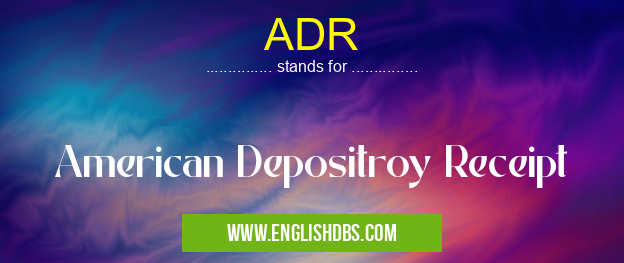What does ADR mean in UNCLASSIFIED
An American Depositary Receipt (ADR) is a negotiable certification issued in the United States by a bank that represents an underlying security held in the bank’s custody in another country. ADRs are created to facilitate the purchase and sale of assets, such as stocks, bonds, options, and funds, which are not normally traded on U.S. exchanges. They provide investors with the same level of protection as shares listed on domestic exchanges and represent ownership or debt interests in foreign companies that may be traded freely among U.S. investors without having to go through the process of sending money abroad to buy those securities directly.

ADR meaning in Unclassified in Miscellaneous
ADR mostly used in an acronym Unclassified in Category Miscellaneous that means American Depositroy Receipt
Shorthand: ADR,
Full Form: American Depositroy Receipt
For more information of "American Depositroy Receipt", see the section below.
What does ADR Mean?
An American Depositary Receipt (ADR) is a type of investment instrument that allows investors to buy and sell foreign securities through their brokerage accounts without having to go through the time-consuming and potentially costly process of purchasing those foreign securities directly. An ADR is a negotiable instrument issued by a U.S.-based financial institution which represents ownership of stock issued by a foreign corporation in its home market. Each ADR corresponds to one share or multiple shares of foreign company stock deposited with a correspondent at a custodian bank overseas who holds it on behalf of the USD Investor. This structure effectively simplifies cross-border transactions for both individual investors as well as institutional participants who seek exposure to foreign markets without having to open international trading accounts for each particular stock they wish to buy or sell.
Advantages Of ADRs
The primary advantage offered by American Depositary Receipts (ADRs) is that they allow US investors access to stocks from around the world without needing to transact abroad or deal with potential uncertainties associated with legal systems outside of their own jurisdiction; this makes international investing much easier for US citizens than it would otherwise be if conducted through direct purchases or local exchange listings abroad. Additionally, ADRs generally carry lower transaction costs than direct investments since currency exchange fees often do not apply . They also provide investment liquidity since there is usually an established trading market already present for these instruments, making them accessible even when local markets close.
Essential Questions and Answers on American Depositroy Receipt in "MISCELLANEOUS»UNFILED"
What is an American Depositry Receipt (ADR)?
An ADR is a type of security that allows investors to buy shares of a foreign company without actually owning the physical stock certificate. It acts as a proxy for shares that are held by a bank in the country where the company is domiciled. ADRs are denominated in U.S. dollars and can be traded on U.S. exchanges just like regular stocks, making them an accessible option for American investors.
Who issues ADRs?
Banks, called depositories, issue ADRs on behalf of companies enter into arrangements with banks to offer their public shares in the form of ADRs to U.S. investors.
How do I invest in an ADR?
Investors can purchase and sell ADRs through any broker or financial institution that offers access to U.S.-based exchanges and have access to foreign-listed companies through these securities.
Are there different types of ADRs?
Yes, there are several types including sponsored and unsponsored, Level 1 and Level 2, as well as global depositary receipts (GDRs). Sponsored ADRs are issued with the involvement of the issuer while unsponsored ones do not have any connection to the issuer beyond filing SEC documents for trading on exchanges in the US market.
Are all international stocks available as an ADR?
No; only certain international stocks from select countries qualify for listing on US Exchanges as an ADR.
What common markets offer securities eligible for listing as an ADR?
Common international markets offered through brokers which offer securities eligible for listing as an ADRs include Mexico, Brazil, Germany, Japan , Australia, Hong Kong China, India and South Korea.
Do I need to pay taxes on my gains from trading SADRS?
Yes; any profits made from trading SADRS will be subject to taxes just like any other security and it is important to research taxation rules specific nations before investing.
Final Words:
In conclusion, American Depositary Receipts (ADRs) offer US-based investors an efficient way to gain exposure to overseas markets while providing some degree of legal protection against certain types of fraud associated with cross-border transactions and investments globally. Although these certificates do carry slightly higher fees than their counterparts listed domestically due primarily to their complexity, these expenses can often be offset by greater potential profits stemming from investing abroad along with reduced risks from being able to more easily keep track of your holdings; this ultimately leads many investors into believing that any additional costs are justified given the benefits provided by owning an ADR certificate.
ADR also stands for: |
|
| All stands for ADR |
